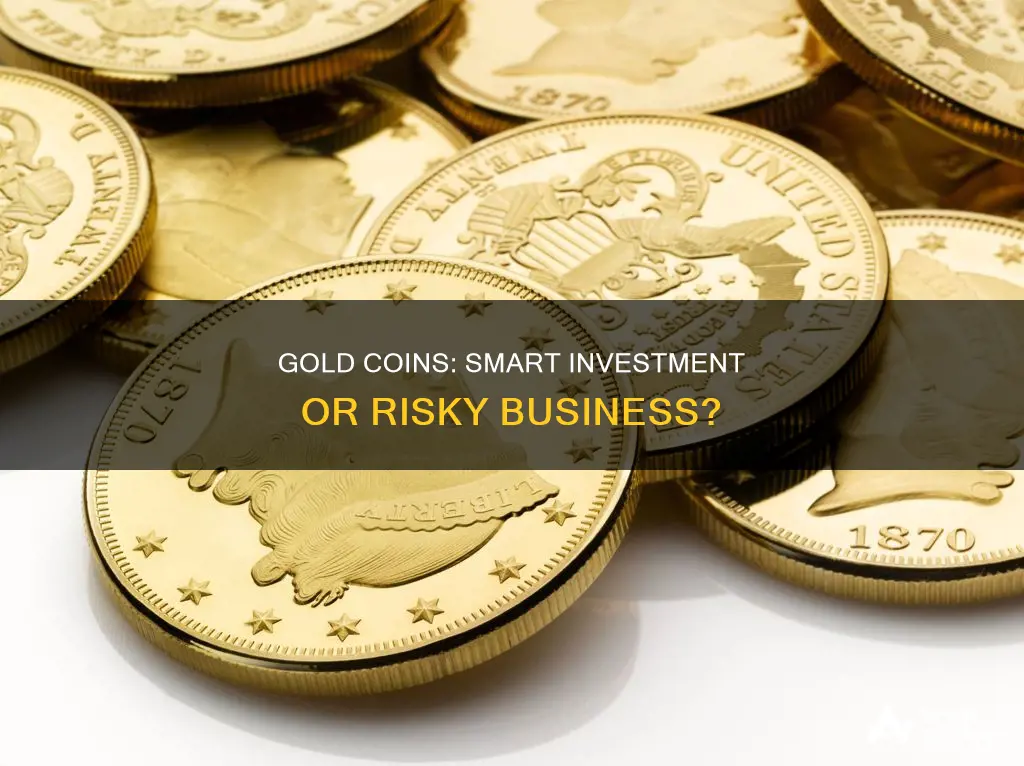
Gold has been a valuable commodity throughout history, and investing in gold coins can be a good way to diversify your portfolio and hedge against inflation. However, it's important to consider the pros and cons before making any investment decisions. On the one hand, gold tends to increase in value when other investments decline, and it can act as a safeguard against inflation. On the other hand, investing in gold coins can be expensive and may not provide the same returns as other investments over time. Additionally, there are costs and complexities associated with storing and insuring gold coins, and the market for gold coins can be volatile, with high markups and low resale value. Ultimately, the decision to invest in gold coins depends on your financial goals, risk tolerance, and investment strategy.
| Characteristics | Values |
|---|---|
| Hedge against inflation | Gold tends to increase in value when the cost of living increases. |
| Safe haven through economic changes | Gold can be a safe-haven asset when the economy turns sour, and the prices of stocks and bonds decline. |
| Diversification | Gold is not correlated to stocks, bonds, or real estate, meaning it can be a place of relative safety when other assets are declining. |
| Liquidity | Gold is fairly liquid. |
| Storage costs | Gold coins are expensive to store. |
| Insurance costs | Gold coins are expensive to insure. |
| Authenticity | There is a risk of buying fake gold coins. |
| Crisis management | Gold coins may not be the best investment in a crisis. |
| Selling price | You may get a poor price when you sell gold coins. |
| Buying costs | Gold coins are expensive to buy. |
What You'll Learn

Gold coins are expensive to buy
The high cost of gold coins is also due to the refining process. Gold is refined to a purity of just over 99.5%, which matches the Good Delivery bullion specification. However, about half of all gold is then alloyed for jewellery manufacture, and most of the rest is retained as stored bullion. As a result, further expensive electrolytic refining to 99.99% is usually pointless. Consumers demand 99.99% gold coins and are willing to pay a premium for them.
Additionally, gold coin manufacturers charge fabrication fees and seignorage, which are passed on to the buyer. These fees do not add any lasting value to the bullion products. In fact, the highest bid prices for gold are for raw bullion in Good Delivery form.
Gold coins are also expensive to buy because of the costs associated with storing and insuring them. You need to keep them in a safe place, such as a highly-rated home safe or a commercial safety deposit box, which can be costly. Insuring gold coins can also be expensive, as they are attractive targets for thieves and insurance fraudsters.
Finally, gold coins may be expensive to buy due to market demand. During times of financial stress or high inflation, the demand for gold coins can increase, driving up prices. Dealers may also raise prices during these times to ration buyers and manage their stock levels.
The Ultimate Guide to Investing in Cryptocurrency with Coinbase
You may want to see also

Gold coins are neither the cheapest nor the safest way to buy gold
Gold coins are bought through traditional coin dealers with around a 7 to 10% 'spread', which is the difference between the dealer's selling price and their buy-back price. This is a very high transaction cost for a modern investment.
The high costs of buying gold coins are easily avoided by going straight to the wholesale markets and buying more reliable, safer, and cheaper Good Delivery bullion, which is also much easier to store, insure, and sell. The maximum round trip dealing costs for Good Delivery bullion is 1.2%, which is about one-sixth of the typical cost of dealing with gold coins.
Gold coins are also expensive to insure because they are easily sold and are attractive not only to thieves but also to insurance fraudsters. It is much cheaper and easier to insure gold when it is kept in professional vaults.
Additionally, there is the risk of authenticity when it comes to gold coins. Fake coins certainly exist, and small bars circulating in private ownership are known to have been filled with tungsten – a metal of similar density to gold.
Moreover, gold coins can be expensive to buy because the economic refining process for gold gets the purity to just over 99.5%, which matches the Good Delivery bullion specification. Consumers worldwide increasingly demand 99.99% gold coins and pay for the privilege. However, no intrinsic value is added with 99.99% refining, and if gold coins are later recast into large bars, this loses both the cost of electrolytic refining and the 99.99% rating.
Finally, there is the hidden risk of coin ownership. Many people buy gold coins as a form of ultimate protection from a future crisis, such as a breakdown of social order or a financial crisis. However, during such times, it is challenging to use gold as money as people are sensibly frightened to be identified as gold owners.
Litecoin Investment Safety: Is It a Secure Bet?
You may want to see also

Gold coins are difficult to store and insure
You can increase the coverage limit by purchasing an additional floater policy, which covers any kind of loss, even those not typically covered by a homeowner's policy, such as misplacing a valuable coin. However, this will require a professional appraisal of your gold coins.
Another option is to rent a safe deposit box at a bank. However, it is important to note that the contents of these boxes are not insured by the Federal Deposit Insurance Corporation (FDIC) or the bank itself. Therefore, you would need to purchase additional insurance to cover the value of your gold coins.
Private vault depositories are another option for storing gold coins. These depositories are managed by third-party companies that specialize in securely storing precious metals. They often provide insurance for your gold coins and allow you to monitor your assets remotely. This option offers superior accessibility, as you can access your gold coins at any time, regardless of the day or time. Additionally, they can meet your liquidity needs by liquidating your assets and transferring the funds to your bank account.
Altcoin Investing Guide for Indians: Getting Started
You may want to see also

Gold coins may be fake or forged
- Check the coin's size and weight. Gold is one of the heaviest metals on Earth, and counterfeit coins containing other metals will be larger in size than pure gold coins of equal weight. For example, a fake one-ounce gold Britannia coin would be wider and/or thicker than a real one to match its weight.
- Perform the "ping" test. Genuine gold makes a distinctive, sharp ringing sound when struck against a hard surface or another gold coin. Other metals will produce a shorter, duller sound.
- Try the magnet test. Gold is not magnetic, so if your coin sticks to a magnet, it likely contains a substantial amount of other metals.
- Use a magnifying glass to check for markings. Fake coins may have signs of discoloration or particular hallmarks, such as "HGP" for Heavy (Hard) Gold Plate or "H.G.E" for Hydrostatic Gold Electroplating.
- Weigh and measure the coin. Fake coins often have inconsistencies in weight and dimensions compared to genuine coins, which are produced to strict standards.
- Perform the float test. Place the coin in a bowl of water; if it's genuine, it will sink to the bottom. However, this test is not foolproof, as fake gold can contain other dense metals that will also sink.
- Do the vinegar test. Gold is non-reactive and doesn't tarnish, so if the coin changes colour when exposed to vinegar, it's not pure gold.
- Buy from a reputable dealer. Carefully research your source and look for companies that sell gold from well-known and internationally trusted sources.
Bit Coin: Safe Investment or Risky Gamble?
You may want to see also

Gold coins may be difficult to sell
Additionally, gold coins may be difficult to sell at a desired price due to their obscurity or lack of recognition. Well-known and widely traded coins, such as the Britannia, Krugerrand, and Sovereign, tend to have stronger secondary markets and are thus easier to sell. In contrast, obscure or unusual gold coins may have limited demand, making it challenging to find buyers willing to pay a premium.
The condition of gold coins also affects their salability. Damaged or scratched coins may fetch a lower price, so proper storage and handling are essential to maintaining their value.
Furthermore, the complexity and costs associated with insuring gold coins can be a hindrance to selling them. Gold coins are attractive targets for thieves and insurance fraudsters, leading to higher insurance premiums. The process of insuring gold coins can be cumbersome and expensive, potentially deterring potential buyers.
Lastly, the reputation and trustworthiness of the seller play a role in successful gold coin sales. Buyers are cautious about scams and fraudulent activities, so establishing credibility and providing documentation for the gold coins' authenticity are crucial in facilitating a sale.
Cryptocurrency Investment: Safe or Risky Business?
You may want to see also
Frequently asked questions
Gold is a safeguard against inflation and can stabilize your portfolio during market declines. Gold tends to increase in value when other investments decline. You also don't have to pay capital gains tax until you sell.
There is a risk of theft, and you won't get dividends or interest from tangible gold. Additionally, you may have to wait years for gold to increase in value. Gold coins also tend to be expensive to buy, store, and insure.
It is recommended to buy gold coins from a reputable dealer or financial institution. You can store them in a safe at home or rent a safe at a bank.







